On February 8th, 2025, our team at No Hunger Initiatives (NHIs) also known as No Hunger Food Bank (NHFB) delivered Agricultural Empowerment tools to the Karon-Majigi PWD camp in Abuja. This initiative marked the beginning of our Vert2FAMNN project, a sustainable intervention aimed at addressing acute anaemic deficiency syndrome and malnutrition.


As Ramadan approaches, we recognize the importance of access to nutrient-rich food, particularly for vulnerable communities. Our Vert2FAMNN project is designed to provide internally displaced female-headed households with the tools and training needed to produce their own food, reducing reliance on external aid and promoting dietary diversity.
The Vertical Backyard Farming for Family Nutrition Needs (Vert2FAMNN) project is an innovative agricultural initiative that promotes vertical backyard farming, a sustainable method of growing vegetable crops in vertically stacked layers. This approach:
- Maximizes space
- Reduces labor-intensive agricultural practices
- Minimizes water consumption
- Increases crop yields
- Lowers environmental and climate impact
The Vert2FAMNN program was recorded by one of NHFB’s committed volunteer photographers and also a videographer at standby, where pictures and videos to capture the program were taken for future referencing and to create community awareness, and publicity on the NHFB’s social media handles. The program was an empowering and innovative one that addresses hunger and malnutrition solutions.
The Karon-Majigi PWD camp, home to many individuals displaced and affected by conflict and disaster, was the targeted location for our Vert2FAMNN project. Our empowerment tools, designed with accessibility in mind, included:
- Vertical planters made from carefully selected, and finely crafted lightweight wood materials.
- Standard watering cans that are portable with modified nozzles, roses and other body parts for easy use
- Exotic breeds of seeds rich in iron, including Amaranthus, bell peppers, tomatoes, and okra which are also treated and viable to enable re-use of seeds after harvest.
- Naturally improved soil, specially prepared with cow dungs, innoculant,Biochar in right proportions to meet the exact requirements of plant nutrients




“I am amazed by the simplicity and effectiveness of the vertical planters, and I so much love the idea to teach the people how to catch a fish and not just being offered the fish constantly” an adage said in the English translation of the Emir of the PWD camp by the P.R.O of the camp. “My people can now grow their own food, despite their physical limitations. I thank the No Hunger Initiatives and the Australian High Commission”
NHFB’s team, along with 27 dedicated volunteers, delivered the empowerment tools and provided comprehensive training to the beneficiaries. The training covered topics such as:
- Soil preparation
- Seed insertion and quantity
- Irrigation
- Crop management
The delivery process was carried out in collaboration with Volunteers across abuja . The empowerment tools such as vertical planters, watering cans, seeds and stakes along with other materials needed for the program’s commencement were transported to the camp using the NHFB van while the group of volunteers were transported through the NHFB Bus. Due to the loads of tools to be used for the empowerment, the NHFB van was used thrice to convey all the materials to the venue of the program.
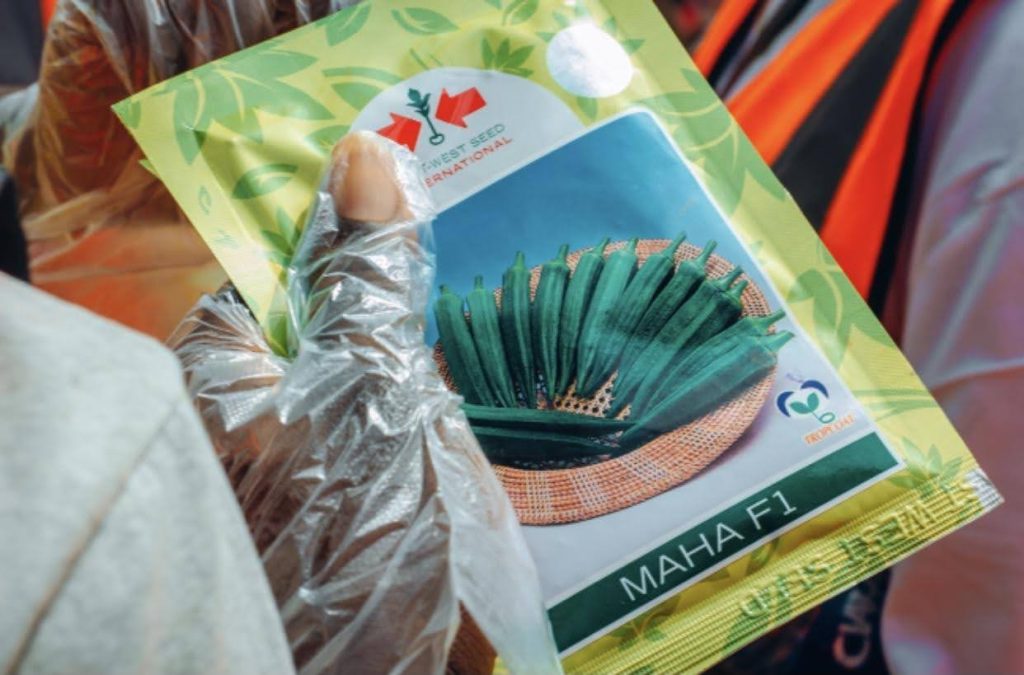
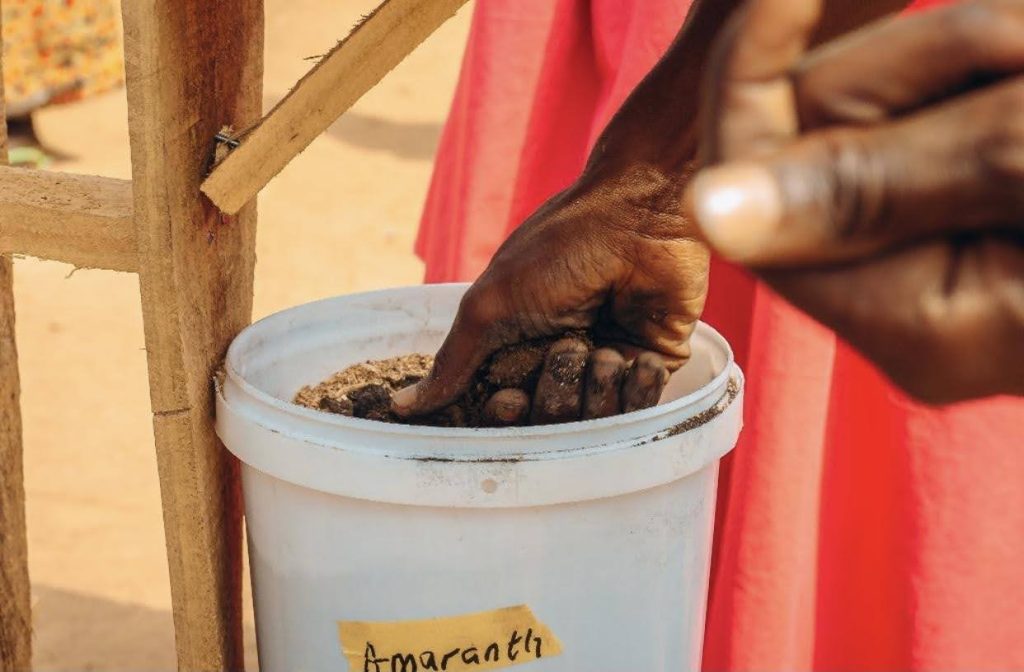
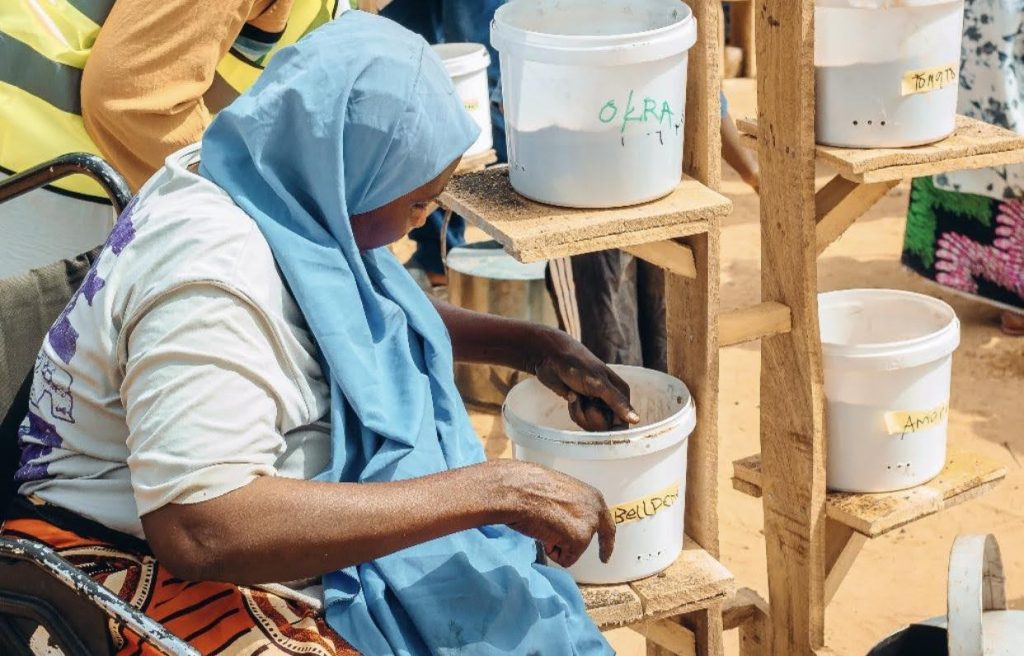
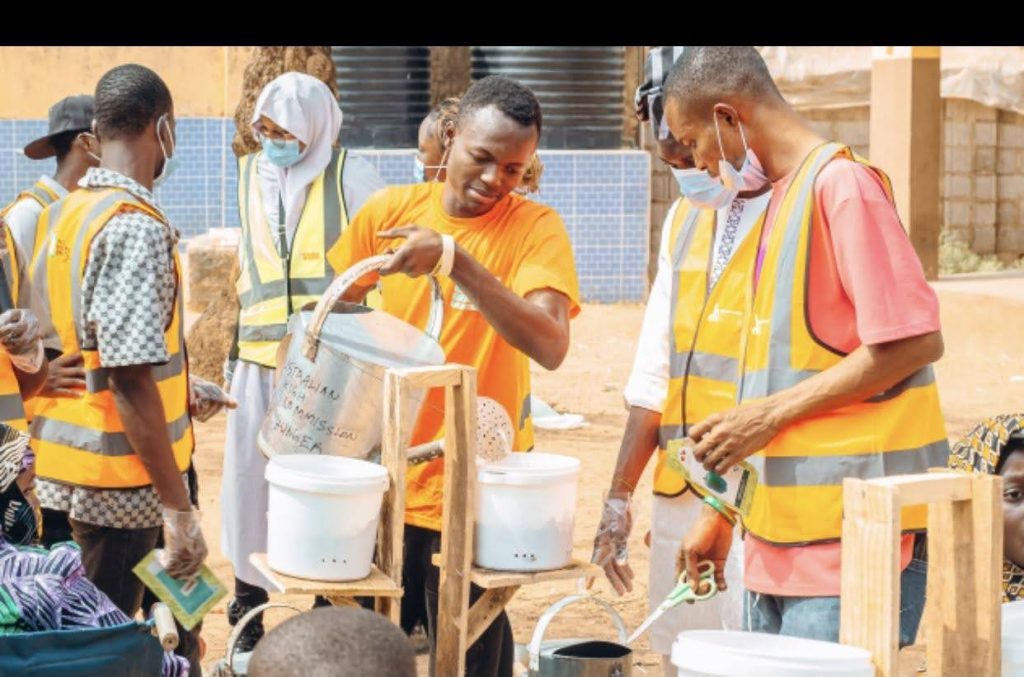
Upon arrival, the vertical planters were inspected by volunteers and found to be in good condition and soil buckets in good shape. The materials and tools to be used were unloaded as well from the van and were moved to a designated area within the camp where the program was held. Women whose data had previously been collected and recorded were already summoned and gathered at the venue, their data was cross checked and as they were properly organized, the program began.
Training was provided to the camp residents living with disabilities for the women on how to use and maintain the vertical planters provided. The vertical planters are expected to have a significant impact on the camp residents, providing direct access to fresh food produce and improving their overall nutrition. Additionally, the planters will help to increase green spaces within the camp, promoting mental health and well-being and while adapting to climate sustainability. Teaching and Empowering the most vulnerable family members to grow and consume vegetables and fruit crops strengthens their immune system while ultimately improving household food security.
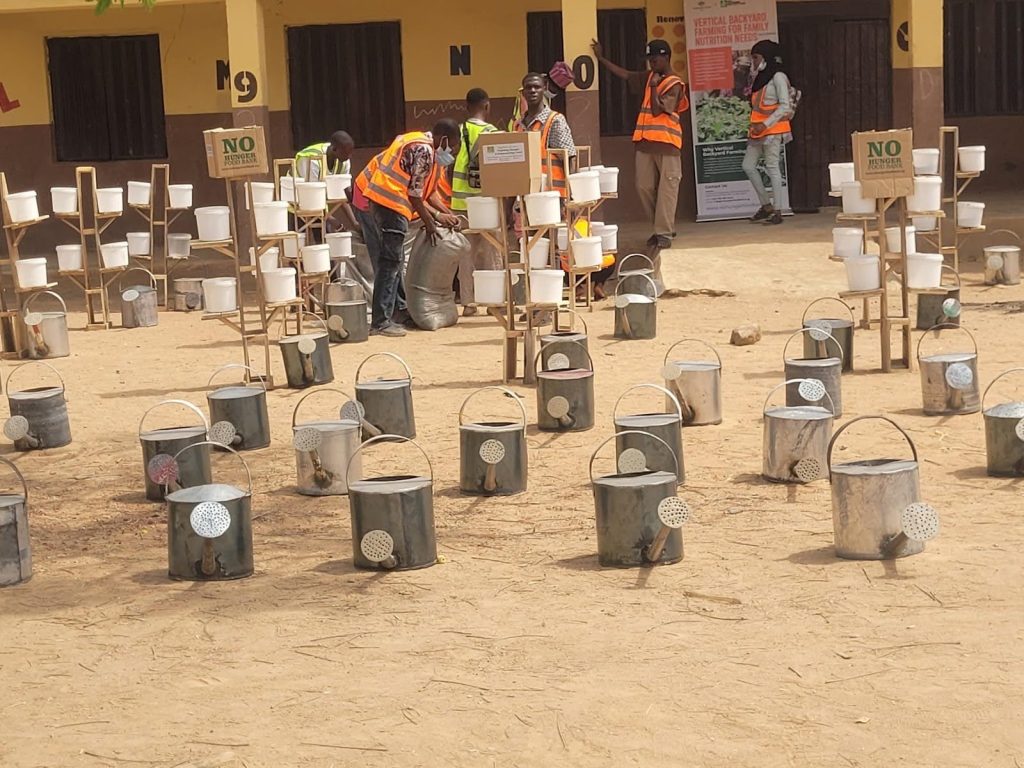
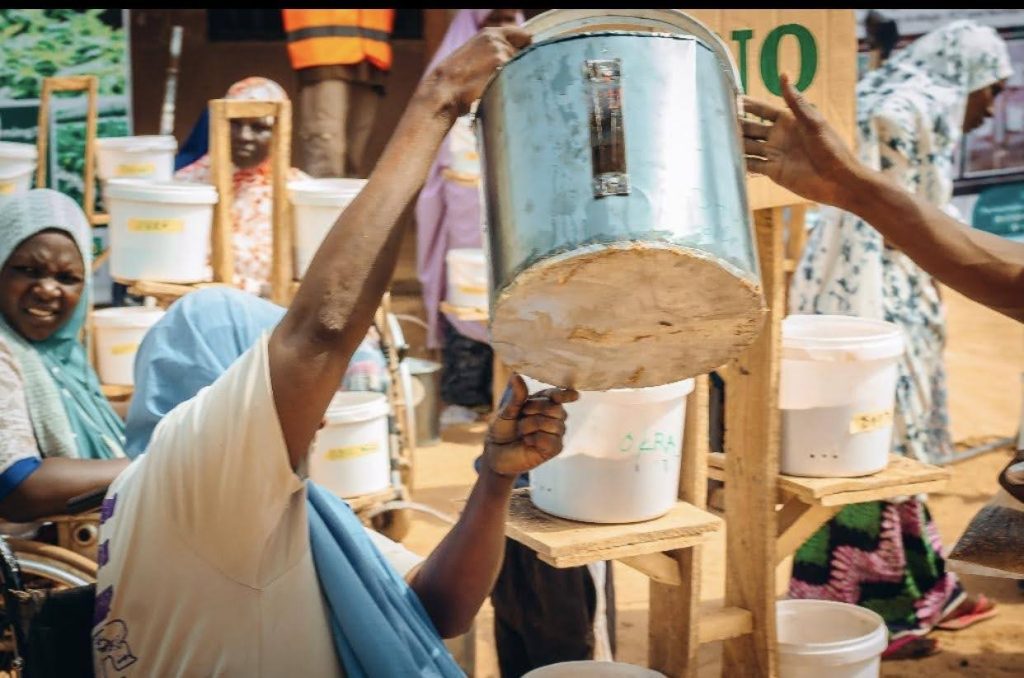
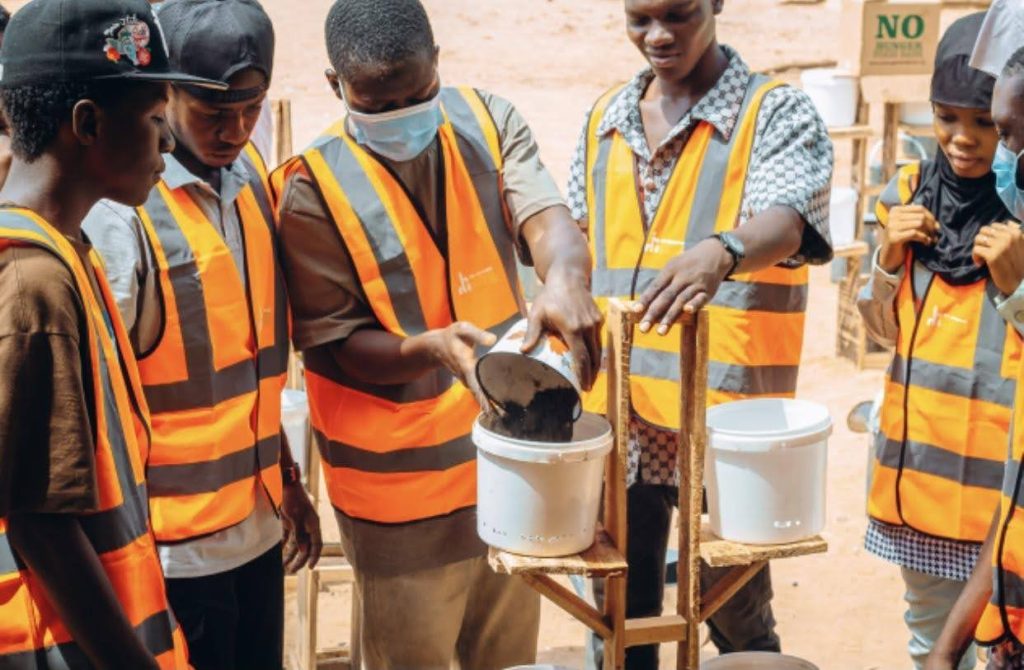
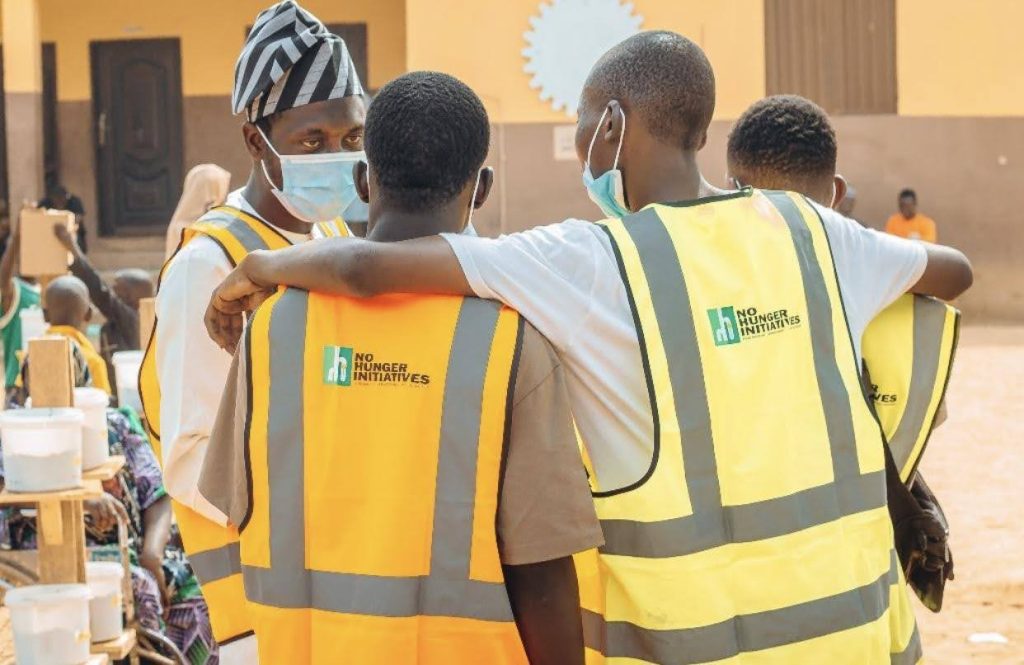
“The training was informative and engaging for us agricultural students,” said Peter Adedayo,one amongst the agricultural volunteers from the university of Abuja who participated in the program. “I was impressed by the enthusiasm of the beneficiaries to learn”.
The Vert2FAMNN project is expected to have a significant impact on the camp residents, providing:
- Direct access to fresh food produce
- Improved nutrition and health outcomes
- Increased green spaces, promoting mental health and well-being
- A sustainable solution to food insecurity
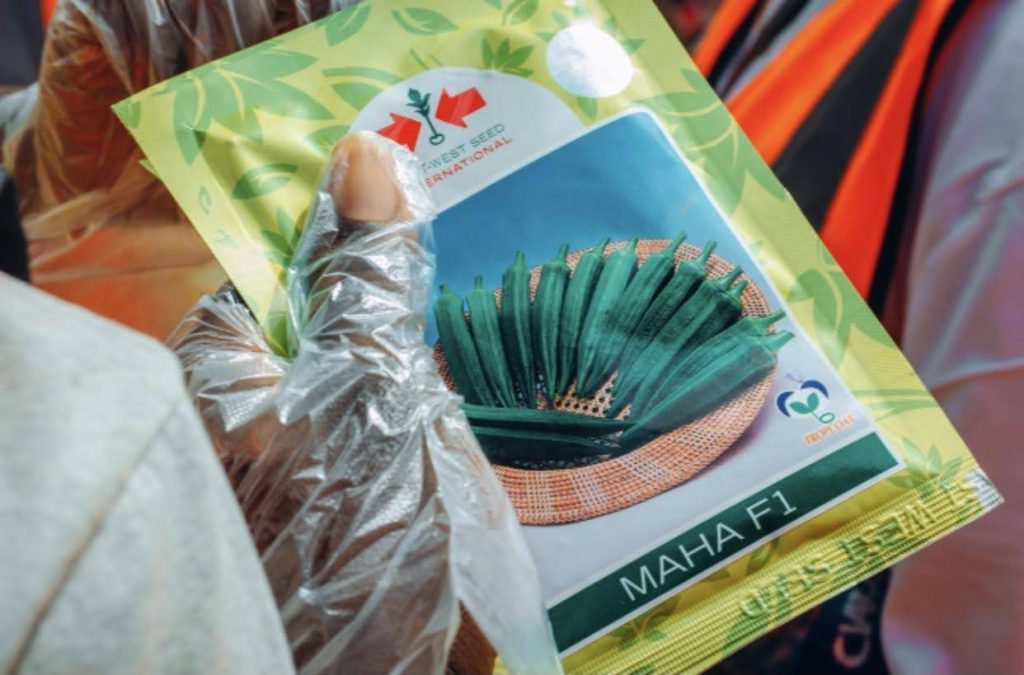
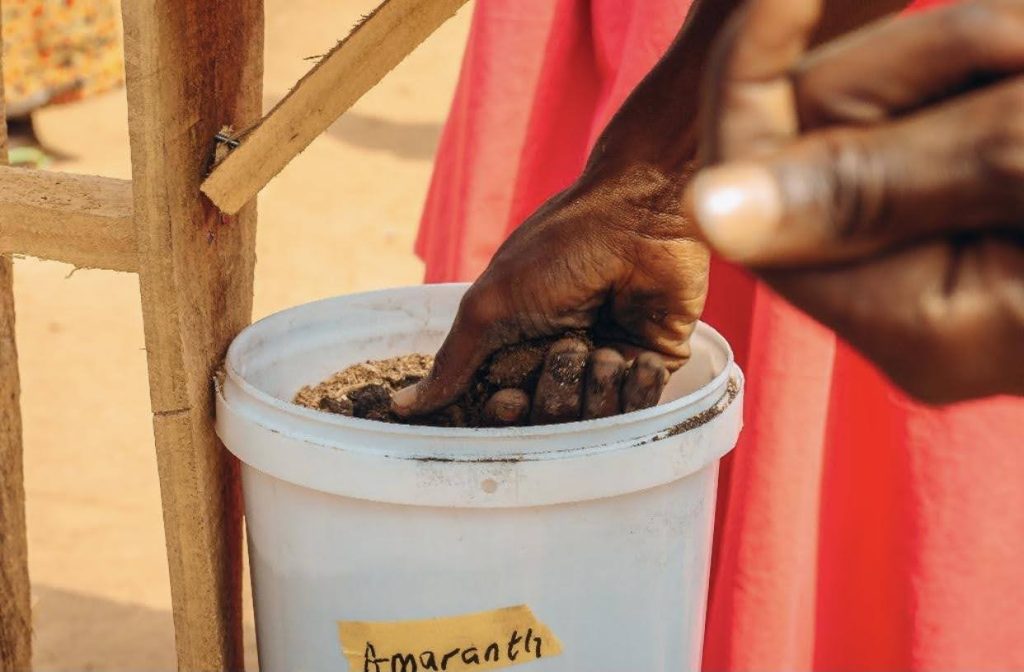
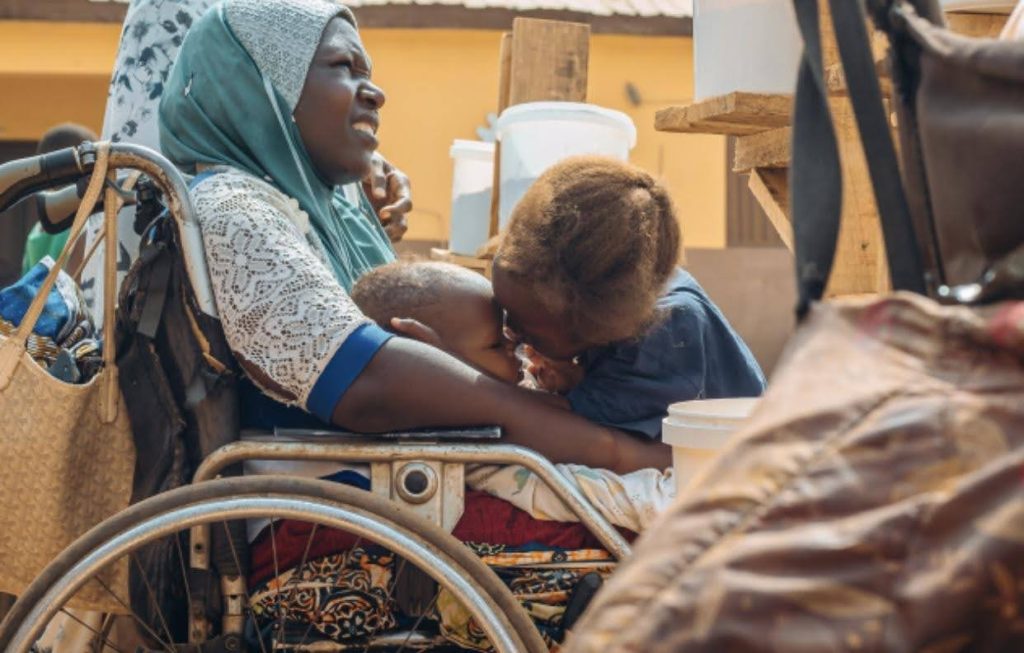
“This project has given me hope for a better future,” said Hadiza Usman, a beneficiary of the program. “I can now provide nutritious food for my family, and I’m grateful for the opportunity.”
At No Hunger Food Bank, we believe in the importance of community engagement and partnerships. Our Vert2FAMNN project was made possible through the collaborative efforts of our volunteers, partners, and the Australian High Commission Nigeria.
As we continue to work towards a hunger-free Nigeria, we invite you to join us in our mission. Together, we can make a difference in the lives of vulnerable communities.
In conclusion, the February 8th Vert2FAMNN outreach program was an informing and resounding success, empowering vulnerable communities and promoting sustainable food systems. We are profoundly grateful to the Australian high commission for endorsing this project and we at NHFB remain committed to addressing the root causes of hunger and malnutrition, and we look forward to continuing our work in Abuja and Northern Nigeria.

















On February 8th, 2025, our team at No Hunger Initiatives (NHIs) also known as No Hunger Food Bank (NHFB) delivered Agricultural Empowerment tools to the Karon-Majigi PWD camp in Abuja. This initiative marked the beginning of our Vert2FAMNN project, a sustainable intervention aimed at addressing acute anaemic deficiency syndrome and malnutrition.
As Ramadan approaches, we recognize the importance of access to nutrient-rich food, particularly for vulnerable communities. Our Vert2FAMNN project is designed to provide internally displaced female-headed households with the tools and training needed to produce their own food, reducing reliance on external aid and promoting dietary diversity.
The Vertical Backyard Farming for Family Nutrition Needs (Vert2FAMNN) project is an innovative agricultural initiative that promotes vertical backyard farming, a sustainable method of growing vegetable crops in vertically stacked layers. This approach:
The Vert2FAMNN program was recorded by one of NHFB’s committed volunteer photographers and also a videographer at standby, where pictures and videos to capture the program were taken for future referencing and to create community awareness, and publicity on the NHFB’s social media handles. The program was an empowering and innovative one that addresses hunger and malnutrition solutions.
The Karon-Majigi PWD camp, home to many individuals displaced and affected by conflict and disaster, was the targeted location for our Vert2FAMNN project. Our empowerment tools, designed with accessibility in mind, included:
“I am amazed by the simplicity and effectiveness of the vertical planters, and I so much love the idea to teach the people how to catch a fish and not just being offered the fish constantly” an adage said in the English translation of the Emir of the PWD camp by the P.R.O of the camp. “My people can now grow their own food, despite their physical limitations. I thank the No Hunger Initiatives and the Australian High Commission”
NHFB’s team, along with 27 dedicated volunteers, delivered the empowerment tools and provided comprehensive training to the beneficiaries. The training covered topics such as:
The delivery process was carried out in collaboration with Volunteers across abuja . The empowerment tools such as vertical planters, watering cans, seeds and stakes along with other materials needed for the program’s commencement were transported to the camp using the NHFB van while the group of volunteers were transported through the NHFB Bus. Due to the loads of tools to be used for the empowerment, the NHFB van was used thrice to convey all the materials to the venue of the program.
Upon arrival, the vertical planters were inspected by volunteers and found to be in good condition and soil buckets in good shape. The materials and tools to be used were unloaded as well from the van and were moved to a designated area within the camp where the program was held. Women whose data had previously been collected and recorded were already summoned and gathered at the venue, their data was cross checked and as they were properly organized, the program began.
Training was provided to the camp residents living with disabilities for the women on how to use and maintain the vertical planters provided. The vertical planters are expected to have a significant impact on the camp residents, providing direct access to fresh food produce and improving their overall nutrition. Additionally, the planters will help to increase green spaces within the camp, promoting mental health and well-being and while adapting to climate sustainability. Teaching and Empowering the most vulnerable family members to grow and consume vegetables and fruit crops strengthens their immune system while ultimately improving household food security.
“The training was informative and engaging for us agricultural students,” said Peter Adedayo,one amongst the agricultural volunteers from the university of Abuja who participated in the program. “I was impressed by the enthusiasm of the beneficiaries to learn”.
The Vert2FAMNN project is expected to have a significant impact on the camp residents, providing:
“This project has given me hope for a better future,” said Hadiza Usman, a beneficiary of the program. “I can now provide nutritious food for my family, and I’m grateful for the opportunity.”
At No Hunger Food Bank, we believe in the importance of community engagement and partnerships. Our Vert2FAMNN project was made possible through the collaborative efforts of our volunteers, partners, and the Australian High Commission Nigeria.
As we continue to work towards a hunger-free Nigeria, we invite you to join us in our mission. Together, we can make a difference in the lives of vulnerable communities.
In conclusion, the February 8th Vert2FAMNN outreach program was an informing and resounding success, empowering vulnerable communities and promoting sustainable food systems. We are profoundly grateful to the Australian high commission for endorsing this project and we at NHFB remain committed to addressing the root causes of hunger and malnutrition, and we look forward to continuing our work in Abuja and Northern Nigeria.